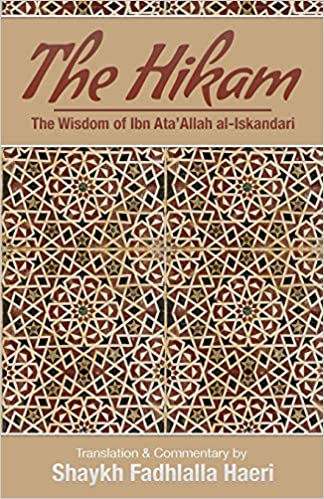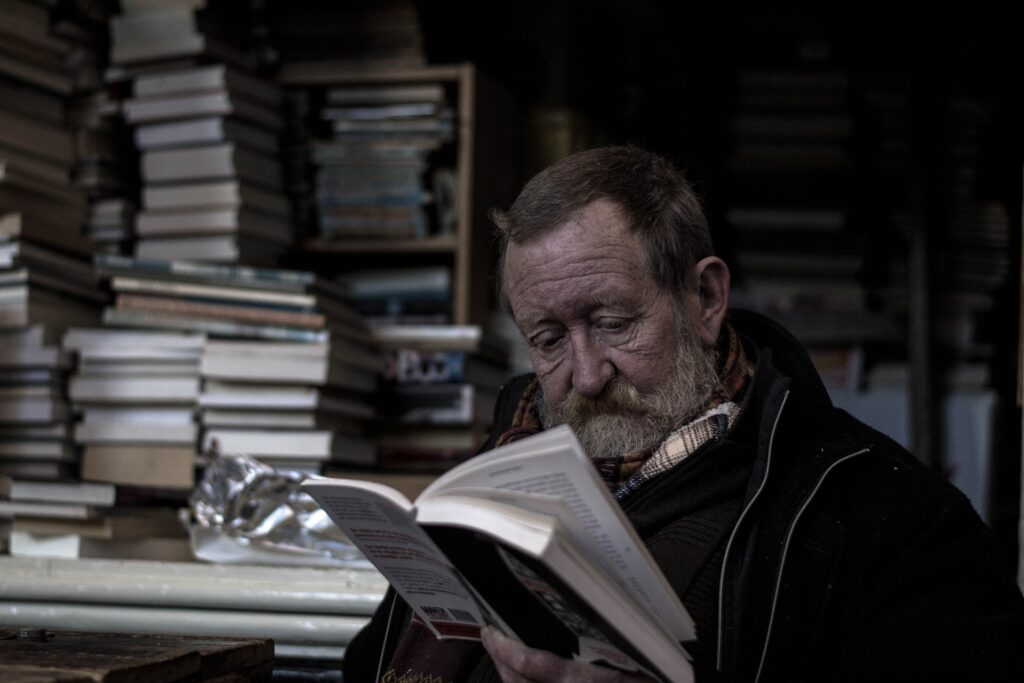
About the Author
Ibn Ata’Allah al-Iskandari was born in Alexandria in the middle of the 13th century CE. He was a Malikite jurist who taught at both the al-Azhar and the Mansuriyyah school in Cairo.
Initially, he wasn’t attracted to Sufism. But he ended up becoming the third great master of the Shadhiliyya order.
The Hikam is considered a classic masterpiece of Sufi teaching.
It’s a collection of 264 aphorisms, translated and commented by Shaykh Fadhlalla Haeri.
The Book in 3 Sentences
1. Understanding the cycles of expansion and constriction gives a better understanding of Allah’s ways.
2. Being in a constant state of spiritual poverty is one of the highest qualities someone can have.
3. Asserting the oneness of God requires removing ‘otherness’ from the heart.
Impressions
It’s the most accessible Sufi book I have.
Yet, I’m 100% sure I didn’t get most of it.
Each aphorism could be commented on in a book.
The days I read the Hikam, my prayers were at another level.
Maybe the aphorism style helps. It forces you to stop with each statement and ponder over it.
The originality of this work is it sheds light on things we pay little attention to.
And by doing so, we realize the flaws in our souls and gain a better understanding of Allah’s ways.
As a result, we improve the quality of our relationship with Him.
My Top 3 Hikam
Hikmah 35
The root of every disobedience, distraction and desire lies in being satisfied with the self. The root of every obedience, vigilance and virtue lies in dissatisfaction with the self.
It’s far better for you to keep company with an ignorant person who is dissatisfied with himself, than to keep company with a learned man who is satisfied with himself.
For what knowledge is there in a self-satisfied scholar? And what ignorance is there in an unlearned man, dissatisfied with himself?
Hikmah 177
If you want to receive gifts, then perfect your spiritual poverty and desperate need: “Alms are only for the poor.” [9:60]
Hikmah 263
Reflection is the lantern of the heart, so when it leaves the heart has no light.
Commentary of My Top 3 Hikam
The imam martyr al-Bouti (رَحِمَهُ ٱللّٰهُ) wrote a four volumes book on The Hikam.
For the Arabic speakers, you’ll find his videos on each one of the 264 aphorisms Here.
For the non-Arabic speakers, the video above is the commentary of 11 aphorisms with English subtitles. It will give a taste of the teachings of this great man.
The commentary of my top 3 is derived from his lectures.
Hikmah 35

The root of every disobedience, distraction and desire lies in being satisfied with the self. The root of every obedience, vigilance and virtue lies in dissatisfaction with the self.
It’s far better for you to keep company with an ignorant person who is dissatisfied with himself, than to keep company with a learned man who is satisfied with himself.
For what knowledge is there in a self-satisfied scholar? And what ignorance is there in an unlearned man, dissatisfied with himself?
Commentary
The self here refers to the carnal desires that Allah put in every human being.
As it is said in the Quran:
“For man’s very soul incites him to evil unless my Lord shows mercy.” [Quran 12:53]
The self is our worst enemy and the first source of our tests.
It’s insane to imagine that the self always incites good.
First, it contradicts what Allah said.
Second, you won’t find any of the righteous who weren’t in a war against their self.
If the self doesn’t invite you to evil, you’re not human. You’re an angel!
We are incited to pursue fame, envy people, hoard money, or cheat to reach our worldly goals.
But what’s the wisdom behind having an evil self?
To be always in need of Allah’s mercy and help to overcome it.
We have a dua (supplication) that says:
“O Ever-Living One, O Eternal One…do not place me in charge of my self even for the blinking of an eye.” [Hisn al-Muslim 123]
If the self is leading the scholars, how can they lead us towards Allah?
Umar (ra) warned us from these types of scholars:
“If you see that a Scholar loves the world, protect your religion from him. Every lover is engrossed in that which he loves.”
That’s why Ibn Ata’Allah advises us to learn from the people who battle against the self, and thus, regardless of their level of knowledge.
The ignorant unsatisfied with the self will try to discipline it. And we will learn from his or her journey.
Hikmah 177

If you want to receive gifts, then perfect your spiritual poverty and desperate need: “Alms are only for the poor.” [9:60]
Commentary
What a quality!
Being in a state of spiritual impoverishment and need for God.
Without a proper understanding of our condition, we’ll fail to have it.
We are helpless, weak, and have no control of our own affairs.
Coming to this realization open the door for God’s generosity.
We are in need of guidance, health, wealth, protection, support during hardships, and much more.
Allah reminds us of our condition when He said:
“O people, it is you who stand in need of God. And God is the All-Sufficient, the Worthy of Praise.” [Quran 35:15]
This is a shared human condition.
Why then do we easily forget about it?
Because when we enjoy many blessings, we start thinking we own them.
But here is the truth:
There’s a wide difference between someone who enjoys something, and another who owns this thing and has control over it.
If we were truly the owners, we would have kept them forever!
We would be able to keep our health, wealth, or safety.
In reality, nothing belongs to us. Not even a single breath.
We are renting every blessing we enjoy.
And to keep them in both lives requires feeling humble before God.
But how to remember our weakness before losing our blessings?
This is a hard thing to do.
When we feel out of need, we become arrogant.
Without remembering God, our blessings blind us.
The pandemic is a good opportunity to reflect on our condition.
In the end, why should Allah shower His blessings upon us?
Does anyone give charity to the rich?
Hikmah 263

Reflection is the lantern of the heart, so when it leaves the heart has no light.
Commentary
The heart refers to the mind, the muscle that pumps blood, or emotions.
Here, the heart refers to the mind.
Ibn Ata’Allah compares the mind to a dark room. Only reflection enlightens it.
Without it, we become worse than cattle:
“We have created many jinn and people who are destined for Hell, with hearts they do not use for comprehension, eyes they do not use for sight, ears they do not use for hearing. They are like cattle, no, even further astray: these are the ones who are entirely heedless.” [Quran 7:179]
When reflection is not there, not only does the mind stop working, but our senses become useless.
Reflection is then more than the lantern of the mind. It’s also the lantern of eyes and ears.
We start paying attention to the unseen, its dangers, and its rewards.
The worst scenario is to put our minds to sleep until death awakens it:
“When death comes to one of them, he cries, ‘My Lord, let me return so as to make amends for the things I neglected.’ Never!” [Quran 23:99-100]
This is the result of focusing exclusively on fulfilling desires, indulging in distractions, and worrying about our provisions.
Apart from death, here’s another story to reflect on.
Adam (as) preoccupied himself with what Allah had guaranteed for him:
“In the garden you will never go hungry, feel naked, be thirsty, or suffer the heat of the sun.” [Quran 20:119-120]
Still, he ate from the forbidden tree looking for immortality.
Instead of focusing on the primary, Adam (as) went after the secondary.
But isn’t it the same way we live our lives? Don’t we worry about what Allah has already written for us?
Reflection puts everything into perspective.
Some of My Favorite Hikam
Hikmah 6
Do not despair when, in spite of intense supplication, there is a delay in receiving the expected gift. He has guaranteed that He will respond in what He chooses for you, and not what you choose for yourself, and at the time He chooses, not the time you desire.
Hikmah 25
No quest which you seek by your Lord is ever withheld [from you], nor will any quest be easy if you rely upon yourself.
Hikmah 32
Looking out for the faults hidden within you is better than looking out for the invisible realities veiled from you.
Hikmah 39
Do not appeal to other-than-Him to remove a need which He Himself has brought upon you. For how can anyone else remove what He Has imposed? And how can he who is unable to free himself of a need free anyone else of one?
Hikmah 44
You may have been a wrongdoer, but by accompanying someone whose state is worse than yours you see virtue in yourself.
Hikmah 49
Let no wrongdoing appear so great to you that it cuts you off from having high expectations of Allah; for indeed, whoever knows his Lord considers his wrongdoing of a minor significance next to His Generosity.
Hikmah 64
Whoever is not thankful for bounties exposes himself to their loss. And whoever is thankful for them, tethers them with their cords.
Hikmah 72
Whoever reaps the rewards of his actions now has proof of its acceptance.
Hikmah 90
It is enough a recompense for your obedience that He considers you worthy of it.
Hikmah 102
When He loosened your tongue by asking, know that He wants to give to you.
Hikmah 114
The forgetful one starts the day by considering what he is going to do, whereas the intelligent one reflects on what Allah expects from him.
Hikmah 129
Nothing will bring you results like your desperate need, nor does anything speed gifts to you quicker than humility and impoverishment.
Hikmah 134
Whoever honors you is only honoring the beauty of His veil upon you. Praise is therefore due to the One Who veiled you, not to the one who honored and thanked you.
Hikmah 135
No one is your companion except one who keeps your company whilst aware of your faults, and that is none other than your Generous Lord. The best one to take as a companion is He Who does not seek you for any benefit that comes to Him from you.
Hikmah 147
If, when given something, the giving expands you, and if, when denied something, the denial contracts you, then conclude by that your immaturity and the insincerity of your slavehood.
Hikmah 149
If you want the door of hopefulness to be opened for you, then consider what comes to you from Him. But if you want the door of fearfulness opened to you, then consider what goes to Him from you.
Hikmah 162
Ignore mankind’s view of you by being concerned with Allah’s view of you. Let go of people’s regard for you by witnessing His attention for you.
Hikmah 164
The Truth is veiled from you because of its extreme closeness to you.
Hikmah 175
Sometimes you will find more benefit in states of desperate need than you find in fasting or prayer.
Hikmah 178
Realize your basic attributes and He will aid you with His great Attributes. Realize your lowliness and He will help you with His Sublimity. Realize your helplessness and He will help you with His Power. Realize your weakness and He will help you with His Might and Force.
Hikmah 192
When you are confused regarding two directions, follow the one less agreeable to the self. For indeed nothing weighs on the self, but that it is true.
Hikmah 207
Do not consider His giving to be slow, but rather see how slow is your approach to Him.
Hikmah 211
Your obedience does not benefit Him nor does your disobedience harm Him. He has only commanded the one and prohibited the other for your own benefit.
Hikmah 222
The fact that you look up to other than Him is a proof that your existence is not for Him. And your concern for losing other than Him is a proof that you have not reached Him.
Hikmah 229
He only made the world a place liable to change and a mine of distress in order to make you undesirous towards it.
Hikmah 231
Useful knowledge is that whose ray of light expands in the breast and removes the veils of the heart.
Hikmah 241
Nothing can remove you from your [human] attributes other than witnessing His Attributes.
Hikmah 258
He has ennobled you with three graces. He made you remember Him, and had it not been for His Grace, you would not have been worthy of the flow of the invocation of Him within you. He made you remember by Him since He confirmed His relationship with you. And He made you remembered by those with Him, thereby completing His Grace upon you.
Hikmah 261
It would be most disappointing if you are relieved from preoccupations and then do not move towards Him, or if there were but few hindrances and yet you do not travel to Him.
Article published: January 10, 2022
Popular Articles
- 7 Lessons from Luqman that Will Make You Wise
- How to Enjoy Salat and Make it Meaningful
- Mongols Invasions: Some Forgotten Lessons to Today’s Muslims
- For or Against Vaccines? That’s Not Really the Question
- Are Muslims Meant to Be Sleep Deprived?
- Islamic Psychology: A Model Where Faith Has Its Place
- Muslims Judging Each Other: Why and How to Be Less Judgy
- The Certainties of Muslims in Uncertain World
- Allah According to Allah: The Beauty Behind the Verse of Light
- Blindness: From the Invisible Gorilla to the Quranic Perspective
- How to Make People Change their Mind: Persuasion!
